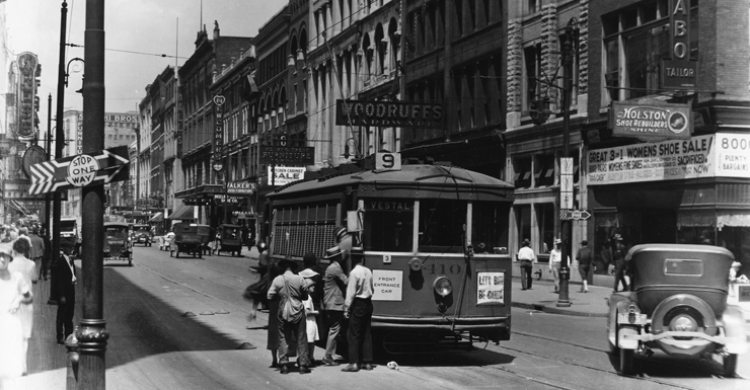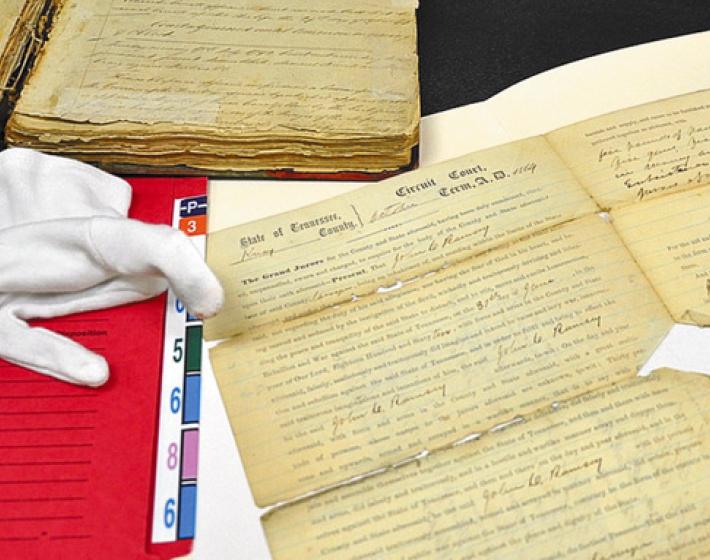Geographically, historically, and politically, East Tennessee is a distinct region within the rest of the state. It is land of mountains and valleys, a land where international research facilities and the state university blend with time-honored traditions and centuries-old stories to create a special place.
The history of East Tennessee–the complex narratives of its land and its peoples–are preserved and interpreted at the East Tennessee History Center (ETHC) in downtown Knoxville. The award-winning research facility and museum is the result of a public-private partnership between Knox County Public Library and the East Tennessee Historical Society.
The heart of ETHC is its collections, representing all of East Tennessee’s 35 counties. You are invited to explore ETHC’s resources and find your place in the past.
Upcoming Events
WORKSHOP: Genealogy and Maps–Where They Intersect
History Parlor: A Book Club for History-Minded Individuals
History Parlor: A Book Club for History-Minded Individuals
Visit ETHC
ETHC is housed in the Custom House, Knoxville’s first federal building and a downtown landmark since 1874. An expansion completed in 2004 beautifully complements the original building and provides access to all of ETHC’s resources. Here are answers to commonly asked questions that will make your visit to ETHC historic:
As departments of Knox County Public Library, the Calvin M. McClung Historical Collection, Knox County Archives, and the Tennessee Archive of Moving Image and Sound are free and open to the public.
The Museum of East Tennessee History, operated by the East Tennessee Historical Society, charges an admission. Please visit the museum’s website for up-to-date visitor information.
The entrance to ETHC is at 601 S. Gay St. (intersection of Gay St. and Clinch Av.) across from the Tennessee Theatre in downtown Knoxville. All departments are accessed from this entrance.
Address: 601 S. Gay St., Knoxville, TN 37902
City of Knoxville Garages: Validation for one hour of free parking is available at Locust Street Parking Garage, which is approximately two-and-one-half blocks from ETHC’s entrance. City of Knoxville garages also offer free parking when entering after 6:00 p.m. weekdays and all day on weekends. For additional parking information, please reference either Downtown Knoxville’s parking map or Parkopedia.
Short-Term Metered Parking: On-street, short-termed metered parking is available near ETHC’s entrance at Gay Street and Clinch Avenue. The spaces are typically limited to two hours and are actively patrolled by parking enforcement.
Handicap Accessible Parking: Two handicap accessible parking spaces are available on Gay Street, directly in front of ETHC. There is a two-hour time limit.
ETHC is at the center of downtown Knoxville and is within steps of world-class hotels, local dining and shopping, and renowned entertainment venues, such as the historic Tennessee and Bijou theatres. Additionally, ETHC is a short walk from historic Blount Mansion, the Sunsphere at World’s Fair Park, the Knoxville Museum of Art, and the art galleries on the 100-block of Gay Street. To plan your history-making trip to Knoxville, visit Downtown Knoxville’s website or stop by Visit Knoxville’s Welcome Center.
History Center Chronicles
ETHC’s team of archivists, curators, historians, and librarians are constantly uncovering stories from the past. Here are some of ETHC’s latest finds, along with general updates, recent acquisitions, and tidbits that may be useful in your historical or genealogical inquiries:

The Gay Street Fire of 1826-1827
New Year 1827 rang in not only with a bang, but also with a towering wave of fire whose terror and devastation were burned into the memory of almost everyone who lived through it.

A Holiday Season in Knoxville Two Hundred Years Ago
One hundred years ago, people were curious about Christmases of the past, too. By the 1920s, Isabella Cowan Rhea (1849-1935) had lived in downtown Knoxville for three quarters of a century, and her family had been in downtown since frontier times.
Who's turning heads now?
A new addition to 601 S. Gay Street is turning heads. But one head in particular is missing. If you’ve noticed the newly installed marble sculpture in a nook at the East Tennessee History Center, you will certainly notice a missing head, and a hand for that matter.

